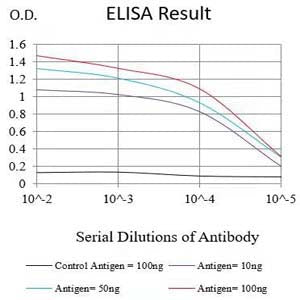
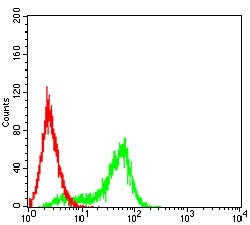
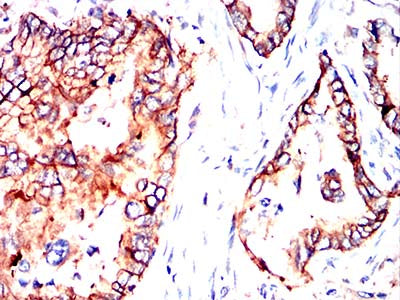
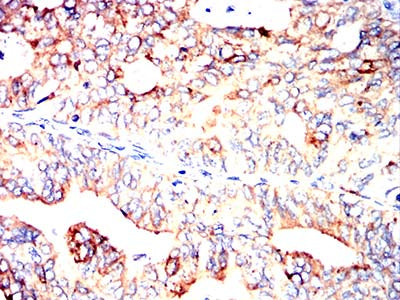
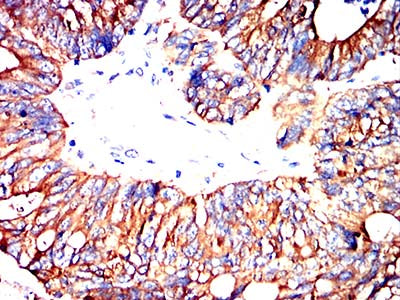
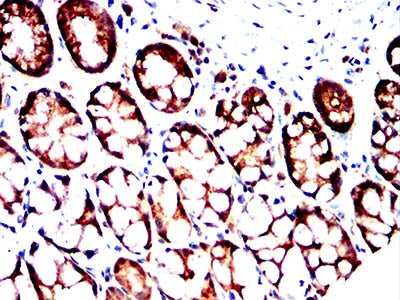
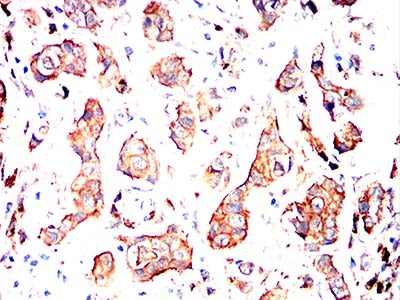
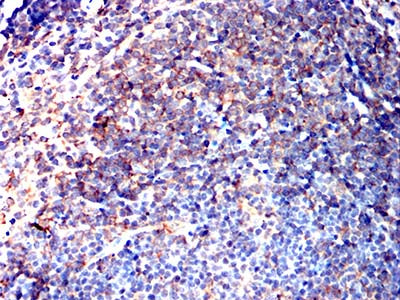
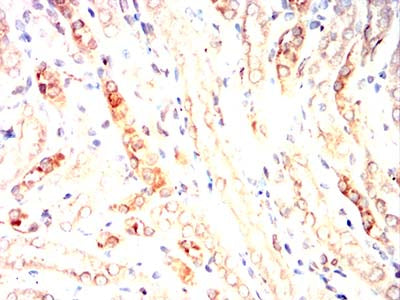
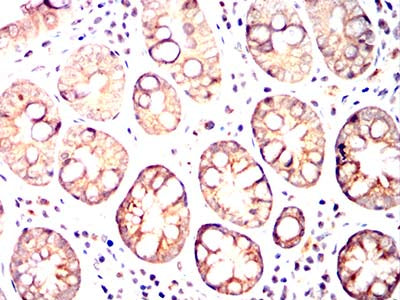
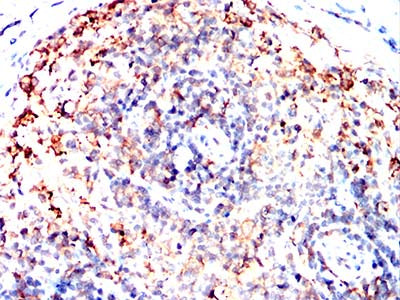
| WB | 咨询技术 | Human,Mouse,Rat |
| IF | 咨询技术 | Human,Mouse,Rat |
| IHC | 1/200 - 1/1000 | Human,Mouse,Rat |
| ICC | 技术咨询 | Human,Mouse,Rat |
| FCM | 1/200 - 1/400 | Human,Mouse,Rat |
| Elisa | 1/10000 | Human,Mouse,Rat |
| Aliases | MLP2; MRP3; ABC31; MOAT-D; cMOAT2; EST90757 |
| Entrez GeneID | 8714 |
| clone | 5F9B12 |
| WB Predicted band size | 43kDa |
| Host/Isotype | Mouse IgG1 |
| Antibody Type | Primary antibody |
| Storage | Store at 4°C short term. Aliquot and store at -20°C long term. Avoid freeze/thaw cycles. |
| Species Reactivity | Human, Mouse, Rat |
| Immunogen | Purified recombinant fragment of human MRP3 (AA: 830-949) expressed in E. Coli. |
| Formulation | Purified antibody in PBS with 0.05% sodium azide |
+ +
以下是关于MRP3抗体的3篇代表性文献及其摘要概述:
1. **文献名称**:*"Monoclonal antibodies specific for multidrug resistance protein 3 (MRP3/ABCC3) inhibit hepatic export of glutathione conjugates"*
**作者**:R. Scheper et al.
**摘要**:该研究开发了针对MRP3蛋白的单克隆抗体,验证了其在Western blot和免疫组化中的应用,并证明MRP3在肝细胞基底膜侧高表达,参与谷胱甘肽结合物的外排,与药物耐药性相关。
2. **文献名称**:*"Immunohistochemical localization of multidrug resistance protein 3 (MRP3/ABCC3) in human gastrointestinal tract and tumors"*
**作者**:T. Hirohashi et al.
**摘要**:通过特异性抗体分析MRP3在正常胃肠道组织和肿瘤中的表达,发现其在结肠癌、胰腺癌中显著上调,提示其可能作为化疗耐药性和预后的潜在标志物。
3. **文献名称**:*"Characterization of MRP3 (ABCC3) antibody specificity in human tissues and cancer cell lines"*
**作者**:G. Jedlitschky et al.
**摘要**:验证了多种MRP3抗体的特异性,发现其在肝、肾及部分癌细胞系中特异性识别MRP3蛋白,并揭示其与有机阴离子转运功能的关联。
如需更多文献或扩展信息,可进一步说明研究方向(如疾病模型、实验方法等)。
The Multidrug Resistance-Associated Protein 3 (MRP3/ABCC3) is a member of the ATP-binding cassette (ABC) transporter superfamily, known for its role in cellular detoxification and drug resistance. Primarily expressed in the liver, intestine, kidneys, and adrenal glands, MRP3 transports a wide range of endogenous and exogenous organic anions, including conjugated metabolites (e.g., bilirubin glucuronides), bile acids, and certain chemotherapeutic agents. Unlike other MRP family members, MRP3 localizes to the basolateral membrane of polarized cells, facilitating substrate efflux into systemic circulation rather than luminal excretion. This unique trafficking pattern links MRP3 to physiological processes like bile acid homeostasis and pathological conditions such as cholestasis, hyperbilirubinemia, and chemotherapy resistance.
MRP3 antibodies are critical tools for studying its expression patterns, subcellular localization, and functional roles. They are widely used in techniques like Western blotting, immunohistochemistry, and immunofluorescence. Research applications span oncology (analyzing drug resistance mechanisms), hepatology (investigating cholestatic liver diseases), and pharmacology (assessing drug disposition). Commercially available MRP3 antibodies vary in specificity, often targeting distinct epitopes within its cytoplasmic or extracellular domains. Validation remains essential due to potential cross-reactivity with other ABC transporters. Recent studies also explore MRP3's involvement in metabolic diseases and inflammation, expanding its relevance beyond classical detoxification pathways.
×